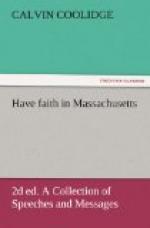We live in a republic. Our Government is exercised through representatives. Their course of action is a very accurate reflection of public opinion. Where shall that be formed and directed unless from the influences, direct and indirect, that come from our institutions of learning. The laws of a republic represent its ideals. They are founded upon public opinion, and public opinion in America up to the present time has drawn its inspiration from the classics. They tell us that Waterloo was won on the football fields of Rugby and Eton. The German war was won by the influence of classical ideals. As a teacher of the classics, as a maker of public opinion, as a source of wise laws, as the herald of a righteous victory,—Amherst College stands on a foundation which has remained unchanged through the ages. May there be in all her sons a conviction that with her abides Him who changes not.
XXXI
HARVARD UNIVERSITY COMMENCEMENT
JUNE 19, 1919
No college man who has ever glanced at the Constitution of Massachusetts is likely to miss or forget the generous references there made to Harvard University. It may need a closer study of that instrument, which is older than the American Constitution, to realize the full significance of those most enduring of guaranties that could then be imposed in behalf of Massachusetts institutions.
The convention which framed our Constitution has as its president James Bowdoin, a son of Harvard. He was a man of great strength of character and cast an influence for good upon the deliberations of his day worthy of a place in history more conspicuous than is generally accorded to him. He had as his colleague on the floor no less a person than John Adams. It is not necessary in this presence to designate his alma mater. There were others of importance, but these represented the type of thought that prevailed.
In that noble Declaration of Rights the principles of freedom and equality were first declared. Following this is set forth the right of religious liberty and the duty of citizens to support places of religious worship and instruction; and in the Frame of Government, after establishing the University, there is given to legislators and magistrates a mandate forever to cherish and support the cause of education and institutions of learning. These were the declaration of broad and liberal policies. They are capable of being combined, for in fact they declare that teaching, whether it be by clergy or laity, is of an importance that requires it to be surrounded with the same safeguards and guaranties as freedom and equality. In fact the Constitution declares that “wisdom and knowledge, as well as virtue, diffused generally among the body of the people, are necessary for the preservation of their rights and liberties.” John Adams and James Bowdoin knew that freedom was the fruit of knowledge. Their conclusions were drawn from the directions of Holy Writ—“Come, know the truth, and it shall make you free.”




